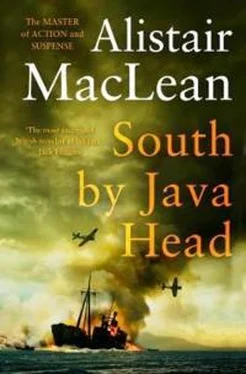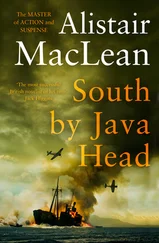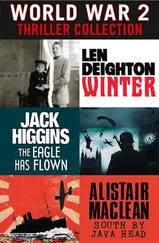1 ...8 9 10 12 13 14 ...74 The telephone above the flag locker shrilled jarringly, insistently, cutting knife-like through the leaden silence on the bridge. Vannier, slight, brown-haired, an officer of only ten weeks standing, was nearest to it. He whirled round, startled, knocked over the binoculars on the locker-top behind him, and fumbled the receiver off its hook. Even through the tan the red flush could be seen creeping up through neck and face.
“Bridge here. What is it?” The voice was meant to be crisp, authoritative. It didn’t quite come off. He listened for a few moments, said thank you, hung up and turned round to find Nicolson standing beside him. “Another distress signal,” he said quickly. Nicolson’s cold blue eyes always made him feel flustered. “Up north somewhere.”
“Up north somewhere.” Nicolson repeated the words, his tone almost conversational, but carrying an undertone that made Vannier squirm. “What position? What ship?” There was a sharp edge to Nicolson’s voice now.
“I– I don’t know, I didn’t ask.”
Nicolson looked at him for a long second, turned away, reached down the phone and began to crank the generator handle. Captain Findhorn beckoned to Vannier and waited until the boy had walked hesitantly across to his corner of the bridge.
“You should have asked, you know,” the captain said pleasantly. “Why didn’t you?”
“I didn’t think it necessary, sir.” Vannier was uncomfortable, on the defensive. “It’s our fourth call today. You – you ignored the others, so I–”
“True enough,” Findhorn agreed. “It’s a question of priorities, boy. I’m not going to risk a valuable ship, a priceless cargo and the lives of fifty men on the off-chance of picking up a couple of survivors from an inter-island steamer. But this might have been a troopship, or a cruiser. I know it’s not, but it might have been. And it might have been in a position where we could have given some help without sticking our necks out too far. All improbable ‘ifs’ and ‘mights’, but we must know where she is and what she is before we make a decision.” Findhorn smiled and touched the gold-braided epaulettes on his shoulders. “You know what these are for? ”
“You make the decisions,” Vannier said stiffly. “I’m sorry, sir.”
“Forget it, boy. But one thing you might remember – to call Mr. Nicolson ‘sir’ once in a while. It’s – ah – expected.”
Vannier flushed and turned away. “Sorry again, sir. I don’t usually forget. I’m – well, I think I’m just a little bit tired and edgy, sir.”
“We all are,” Findhorn said quietly. “And not a little bit, either. But Mr. Nicolson isn’t – he never is.” He raised his voice. “Well, Mr. Nicolson?”
Nicolson hung up the receiver and turned round.
“If we go north, the chances of our getting as far as Rhio and back again are less than remote: they do not exist. Let us not deceive ourselves about that. It may be a trap – it probably is: the Kerry Dancer left before us and she should have been through Rhio six hours ago. If it’s not a trap, the probability is that the Kerry Dancer is at this moment sinking, or has sunk. Even if she is still afloat, fire will have forced passengers and crew to abandon ship. If they’re just swimming around – most of them wounded men – there’ll be mighty few of them left in the six or seven hours it would take us to get there.”
Findhorn paused for some moments, lit a cigarette in defiance of the company’s and his own regulations, and went on in the same flat monotone.
“They may have taken to their boats, if they had any boats left after bombs, machine-guns and fire had all had a go at them. Within a few hours all the survivors can land on any one of a score of islands. What chance have we got of finding the right island in total darkness in the middle of a storm, assuming that we were crazy enough; – suicidal enough – to move into the Rhio Straits and throw away all the sea-room we must have in the middle of a typhoon?” He grunted in irritation as spiralling smoke laced his tired eyes – Captain Findhorn hadn’t left the bridge all night – gazed down with mild surprise, as if seeing it for the first time, at the cigarette clipped between his fingers, dropped it and ground it out with the heel of his white canvas shoe. He stared down at the crushed stub for long seconds after it had gone out, then looked up, his gaze travelling slowly round the four men in the wheelhouse. The gaze meant nothing – Findhorn would never have included the quartermaster, bo’sun or the fourth officer in his counsels. “I can see no justification whatsoever for jeopardising the ship, the cargo and our lives on a wild goose chase.”
No one said anything, no one moved. The silence was back again, heavy, foreboding, impenetrable. The air was still, and very airless – the approaching storm, perhaps. Nicolson was leaning against the flag locker, hooded eyes looking down at his hands clasped before him: the others were looking at the captain, and not blinking: the Viroma had now slewed yet further off course, ten, perhaps twelve degrees, and still swinging steadily.
Captain Findhorn’s wandering gaze finally settled on Nicolson. The remoteness had gone from the captain’s eyes now, when he looked at his first mate.
“Well, Mr. Nicolson?” he asked.
“You’re perfectly right, sir, of course.” Nicolson looked up, gazed out the window at the foremast swaying slowly, gently, under the lift of the deepening swell. “A thousand to one that it’s a trap, or, if it isn’t, ship, crew and passengers will all be gone by now – one way or another.” He looked gravely at the quartermaster, at the compass, then back at Findhorn again. “But as I see we’re already ten degrees off course and still slewing to starboard, we might as well save trouble and just keep on going round to starboard. The course would be about 320, sir.”
“Thank you, Mr. Nicolson.” Findhorn let his breath escape in a long, almost inaudible sigh. He crossed over towards Nicolson, his cigarette case open. “For this once only, to hell with the rules. Mr. Vannier, you have the Kerry Dancer ’s position. A course for the quartermaster, if you please.”
Slowly, steadily, the big tanker swung round, struck off to the north-west back in the direction of Singapore, into the heart of the gathering storm.
A thousand to one were the odds that Nicolson would have offered and the captain would have backed him in that and gone even further – and they would both have been wrong. There was no trap, the Kerry Dancer was still afloat and she hadn’t been abandoned – not entirely.
Still afloat, at two o’clock on that sultry, breathless mid-February afternoon in 1942, but not looking as if she would be afloat much longer. She was deep in the water, down by the head and listing over so heavily to starboard that the well-deck guardrail was dipping into the sea, now lost in it, now showing clear as the long, low swell surged up the sloping deck and receded, like waves breaking on a beach.
The for’ard mast was gone, broken off about six feet above the deck; a dark, gaping hole, still smouldering, showed where the funnel had been, and the bridge was unrecognisable, a scrapyard shambles of buckled steel plates and fractured angle-irons, outlined in crazy, surrealist silhouette against a brazen sky.
The fo’c’sle – the crew’s quarters just for’ard of the well-deck – looked as if it had been opened up by a gigantic can-opener, the scuttles on the ship’s side had disappeared completely and there was no trace of anchors, windlass or for’ard derrick winch; all this fo’c’sle damage the result, obviously, of a bomb that had penetrated the thin steel deck plating and failed to explode until it was deep inside the ship. No one there at the time could have known anything about it, for the lethal blast would have been far faster than realisation. Abaft the well-deck, the wood-lined accommodation quarters on the main and upper decks had been completely burnt out, gutted as far as the after well, sky and sea clearly visible through the gaunt and twisted framework.
Читать дальше
Конец ознакомительного отрывка
Купить книгу










